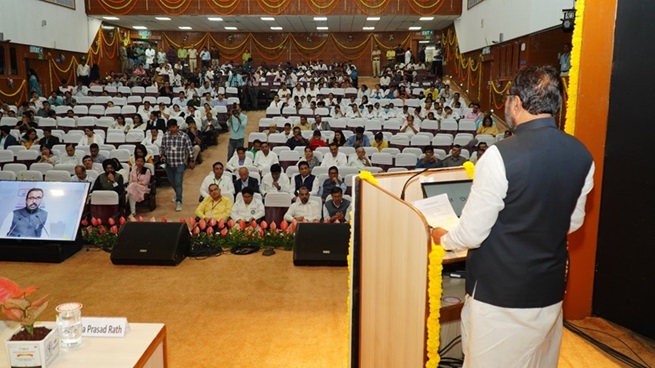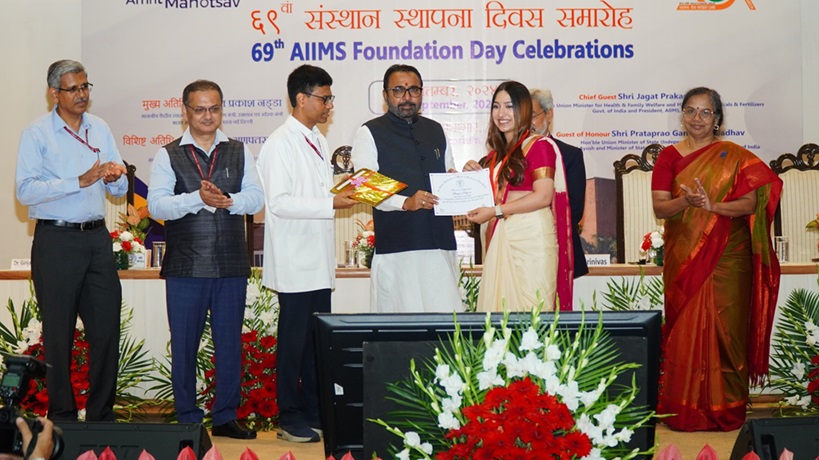Last Updated on September 25, 2024 7:03 pm by INDIAN AWAAZ
69th Foundation Day Celebrations of AIIMS New Delhi
AIIMS New Delhi now serves as the National Resource Centre of the National Medical College Network of the Union Health Ministry
ANDALIB AKHTER / New Delhi
Union Minister of State of Health and Family Welfare, Prataprao Jadhav has said that the country’s health sector witnessed tremendous growth over the last 10 years.
Addressing the 69th Foundation Day of the All India Institute of Medical Sciences (AIIMS) in New Delhi today, Mr Jadhav said that the government has taken a slew of measures, such as increasing medical seats and opening medical colleges in every district. He added that the government has built a robust medical infrastructure to provide affordable healthcare facilities to the public. Mr Jadhav also praised the AIIMS community for their tireless and selfless efforts at the forefront of public service. The AIIMS has organized an exhibition that includes a health camp and a dental camp. The exhibition will continue until the 27th of this month.

AIIMS Director Dr M Srinivas has said that the exhibition has been organized to commemorate 69 years of AIIMS. He mentioned that all the departments of AIIMS are showcasing their innovations and sharing information that is useful to the public. Dr Srinivas urged the public to attend the exhibition and witness the innovations and contributions made by AIIMS.

It was informed that over 900 extramural research projects are being funded by national and international agencies, amounting to a total grant of nearly Rs. 200 crores while AIIMS itself has funded over 240 intramural research projects apart from providing travel fellowships to students, residents, PhD scholars, and staff to participate in national and international conferences. AIIMS Delhi has also started the Centre for Medical Innovation & Entrepreneurship as a Bio-Incubator under the BIRAC – BioNEST Scheme.
Jadhav said that AIIMS has planned for building a new hostel complex with 2200 rooms, with an estimated cost of approximately Rs 900 crores. He also highlighted new academic facilities that were added recently such as the Mother and Child Block, Surgery Block and the National Centre of Ageing which are fully functional now. Over the last 2 years, the inpatient beds have increased by more than 30%, Intensive care and operation theatre services by nearly 40%. These new facilities will improve the ability of AIIMS to cater to the huge clinical demand. AIIMS has also been entrusted with the responsibility to operationalize the Central Armed Police Forces Institute of Medical Sciences (CAPFIMS) at Maidangarhi.
The Union Minister kicked off the Foundation Day celebration by officially inaugurating an exhibition showcasing the innovative research and projects undertaken by various departments at AIIMS. He also took a tour of the exhibition.
The Union Minister also inaugurated the awards ceremony, recognizing the achievements of students and staff with medals and book prizes. Awards were also given for outstanding contributions to the Institute Day Exhibition, celebrating excellence in research and innovation.
AIIMS New Delhi has undertaken various IT initiatives and has developed various softwares in-house for a wide range of services. The SANTUSHT portal enables patients to register their grievances online, track the status, and provide feedback regarding the resolution. To increase transparency and to maintain the trust that the patients have in AIIMS, realtime dashboards have been developed and made available to the public. The management of IT infrastructure and network has also been digitized for prompt resolution of any hardware or network issues. Triage Register for Emergency Department is a web application which helps to keep the record of patient’s Disease Condition, Medical Examination and improves patient safety by ensuring timely cross-consultation by various departments. The Union Minister launched these digital initiatives during the event. He also inaugurated a fire station at AIIMS which will have a manpower of 6 men. It is the first such station exclusively for any medical institute.
Prof. M Srinivas, Director, AIIMS New Delhi said “AIIMS has already received NABH certification for some of its blocks and centers and is in the process of NABH certification of all the centers including the main hospital. He highlighted that NABL accreditation of all laboratories in a phased manner is under process. He also informed that AIIMS has also been the forerunner in the implementation of Ayushman Bharat Digital Mission (ABDM). “It has overcome various challenges and has been a role model for the country by creating more than 7 lakh ABHA IDs and more than 20 lakh scan and share tokens”, he said.
Established in 1956, AIIMS was created with the vision of providing high-quality medical education and comprehensive healthcare services. The institute was established as part of a larger effort to address the critical need for well-trained healthcare professionals in India. Recognizing the challenges in healthcare access and quality, the Indian government aimed to create an institution that would set benchmarks in medical training and patient care.
From its inception, AIIMS has been a pioneer in developing innovative medical practices and cutting-edge research. Its comprehensive approach includes a focus on preventive, curative, and rehabilitative care, making it a model for medical institutions across the country. Over the decades, AIIMS has evolved to become not just a premier medical college, but also a leading research center, contributing significantly to advances in various fields of medicine.
Importance of AIIMS in National Healthcare
AIIMS, New Delhi, has played a pivotal role in shaping India’s healthcare landscape. Here are some key aspects of its importance:
- Quality Medical Education: AIIMS has been instrumental in training thousands of medical professionals who have gone on to serve in various capacities across the country. Its rigorous academic programs ensure that students receive not only theoretical knowledge but also practical training, enabling them to provide high-quality care to patients.
- Research and Innovation: The institute is known for its cutting-edge research in various fields, including cardiology, oncology, and neuroscience. AIIMS researchers have made significant contributions to medical science, often translating their findings into real-world applications that benefit patients.
- Public Health Initiatives: AIIMS has actively engaged in public health outreach programs, focusing on preventive care and health education. These initiatives aim to improve healthcare access for marginalized communities, aligning with the government’s goals to promote health equity.
- National Health Policies: AIIMS has served as an advisory body to the government on various health policies and programs. Its research findings and expert recommendations have influenced health policy decisions, ensuring that they are evidence-based and aligned with the needs of the population.
- Response to Health Crises: During health emergencies, such as the COVID-19 pandemic, AIIMS played a crucial role in managing care, conducting research, and providing guidance on best practices. Its leadership in crisis management has been vital in safeguarding public health.

